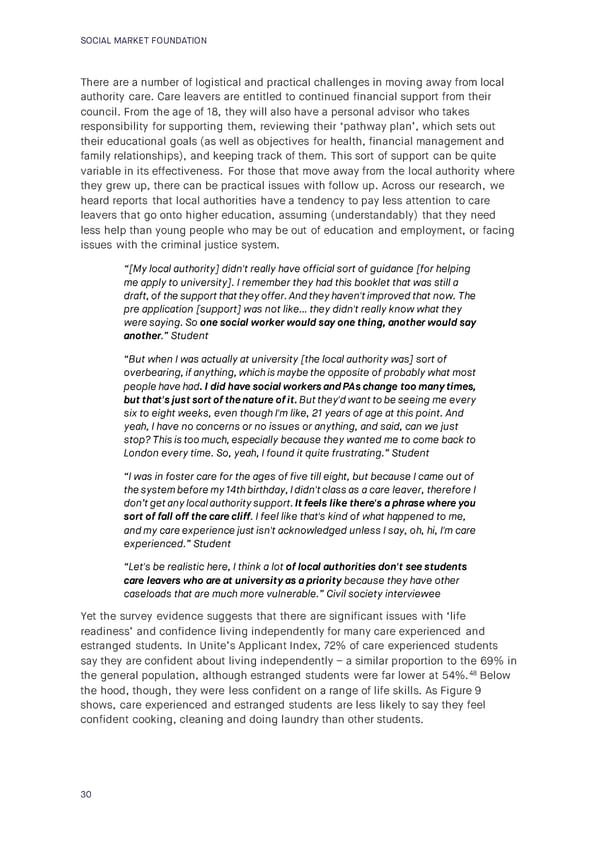SOCIAL MARKET FOUNDATION There are a number of logistical and practical challenges in moving away from local authority care. Care leavers are entitled to continued financial support from their council. From the age of 18, they will also have a personal advisor who takes responsibility for supporting them, reviewing their ‘pathway plan’, which sets out their educational goals (as well as objectives for health, financial management and family relationships), and keeping track of them. This sort of support can be quite variable in its effectiveness. For those that move away from the local authority where they grew up, there can be practical issues with follow up. Across our research, we heard reports that local authorities have a tendency to pay less attention to care leavers that go onto higher education, assuming (understandably) that they need less help than young people who may be out of education and employment, or facing issues with the criminal justice system. “[My local authority] didn't really have official sort of guidance [for helping me apply to university]. I remember they had this booklet that was still a draft, of the support that they offer. And they haven't improved that now. The pre application [support] was not like… they didn't really know what they were saying. So one social worker would say one thing, another would say another.” Student “But when I was actually at university [the local authority was] sort of overbearing, if anything, which is maybe the opposite of probably what most people have had. I did have social workers and PAs change too many times, but that's just sort of the nature of it. But they'd want to be seeing me every six to eight weeks, even though I'm like, 21 years of age at this point. And yeah, I have no concerns or no issues or anything, and said, can we just stop? This is too much, especially because they wanted me to come back to London every time. So, yeah, I found it quite frustrating.” Student “I was in foster care for the ages of five till eight, but because I came out of the system before my 14th birthday, I didn't class as a care leaver, therefore I don’t get any local authority support. It feels like there's a phrase where you sort of fall off the care cliff. I feel like that's kind of what happened to me, and my care experience just isn't acknowledged unless I say, oh, hi, I'm care experienced.” Student “Let's be realistic here, I think a lot of local authorities don't see students care leavers who are at university as a priority because they have other caseloads that are much more vulnerable.” Civil society interviewee Yet the survey evidence suggests that there are significant issues with ‘life readiness’ and confidence living independently for many care experienced and estranged students. In Unite’s Applicant Index, 72% of care experienced students say they are confident about living independently – a similar proportion to the 69% in the general population, although estranged students were far lower at 54%.48 Below the hood, though, they were less confident on a range of life skills. As Figure 9 shows, care experienced and estranged students are less likely to say they feel confident cooking, cleaning and doing laundry than other students. 30
 Care and Learning in Higher Education Page 30 Page 32
Care and Learning in Higher Education Page 30 Page 32